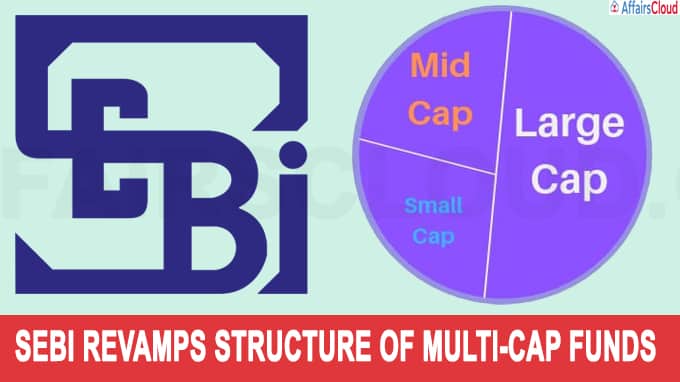 On September 10, 2020, the Securities and Exchange Board of India (SEBI) publicized a partially modified portfolio structure for multi-cap mutual funds category through a circular stating minimum investment in equity & equity related instruments and definition of large-cap, mid-cap and small-cap.
On September 10, 2020, the Securities and Exchange Board of India (SEBI) publicized a partially modified portfolio structure for multi-cap mutual funds category through a circular stating minimum investment in equity & equity related instruments and definition of large-cap, mid-cap and small-cap.
- With regard to this, Asset Management Company (AMC) will now have to invest at least 25% of their portfolios across large-cap, mid cap and small cap companies each. This decision has been taken for decreasing the risk of being overweight on any one kind of market-cap firm.
The definition of large-cap, mid-cap and small-cap as follows:
- Large Cap: 1st -100th company in terms of full market capitalization
- Mid Cap: 101st -250th company in terms of full market capitalization
- Small Cap: 251st company onwards in terms of full market capitalization
As per the circular the minimum investment in equity & equity related instruments: 75% of total assets in the following manner:
- For large-cap companies: 25% of total assets
- For mid cap companies: 25% of total assets
- For small cap companies: 25% of total assets
Key Points:
-SEBI has mandated that the existing schemes Multi Cap Funds will have to comply with the above provisions within one month from the date of publishing the next list of stocks by Association of Mutual Funds in India (AMFI), i.e. January 2021.
-Multi-cap funds currently have assets under management of Rs1.46 trillion. Hence, this modification can shift around Rs 30,000 crore into mid- and small-caps over the next few months as these funds raise their mid- and small-cap allocation from 30% to 50% as required by the SEBI rules.
What are Large-Cap, Mid-Cap, and Small-Cap Funds?
Large Cap funds : An equity funds which invest at least 80% of their total assets in large-cap stocks. Large-cap companies are reliable and sturdy with an excellent open record.
Mid-cap funds : An open-ended, equity funds which invest around 65% of their total assets in equity and equity-related instruments of mid-cap companies. These companies have been around for quite some time and have a good track record too.
Small-cap funds : These are open-ended equity funds which invest a minimum of 65% of their total assets in small-cap stocks. These are the smaller companies or the new one which enter into business market. They are usually recommended for investors with higher risk tolerance.
Recent Related News:
The Central Board of Direct Taxes (CBDT) and SEBI signed a Memorandum of Understanding (MOU) for the data exchange between the two organisations on a regular basis for doing their functions under various laws.
About Securities and Exchange Board of India (SEBI):
Headquarter– Mumbai, Maharashtra
Chairman– Ajay Tyagi




